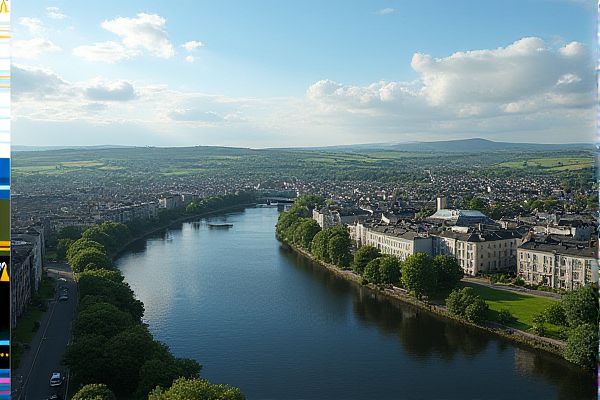
Utilities setup and providers in Ireland: Electricity Providers: Electric Ireland, Bord Gais Energy, SSE Airtricity. Gas Suppliers: Bord Gais Energy, Electric Ireland, Flogas. Water Service: Irish Water manages water supply. Internet Providers: Eir, Virgin Media, Vodafone. Phone Services: Three, Vodafone, Eir. Meter Reading: Regular readings reduce estimated bills. TV License Required: Legal requirement for TV ownership. Switching Providers: Often leads to better deals. Prepaid Utility Options: Available for electricity and gas. Utility Bills: Typically due monthly or bimonthly.
Electricity Providers: Electric Ireland, Bord Gáis Energy, SSE Airtricity.
In Ireland, key electricity providers play a significant role in meeting the country's energy needs, with Bord Gais Energy being one of the prominent players. This company is dedicated to generating, selling, and trading energy, with a substantial power generation plant and a vast customer base across the nation. Additionally, Electric Ireland, the retail division of ESB, stands out by supplying electricity and gas to millions of homes and businesses, offering a variety of tariffs and services. Another noteworthy provider is SSE Airtricity, which is recognized as the largest supplier of green energy in the region, delivering 100% renewable electricity alongside smart plans and home upgrade services like solar panels and EV chargers. Bord Gais Energy, with its strong market presence and commitment to sustainable energy, continues to be a crucial part of the Irish energy sector.
Gas Suppliers: Bord Gáis Energy, Electric Ireland, Flogas.
Bord Gáis Energy, Electric Ireland, and Flogas stand as key gas suppliers in Ireland. Bord Gáis Energy, part of the Centrica plc Group, delivers gas, electricity, and boiler services to over 750,000 customers. Electric Ireland, the retail division of ESB, offers both gas and electricity to a substantial customer base. Meanwhile, Flogas provides natural gas, electricity plans, and LPG home heating services, effectively catering to various market sectors including domestic, commercial, and industrial users.
Water Service: Irish Water manages water supply.
Irish Water, now known as Uisce Eireann, is the National Water Utility responsible for providing and developing water and wastewater services throughout Ireland. The organization manages national water and wastewater assets, maintenance, investment, and customer care. It is regulated by the Commission for Regulation of Utilities (CRU) and the Environmental Protection Agency (EPA). For more detailed information, you can visit their official website at Irish Water. The diligent oversight ensures that all water resources are managed sustainably for both current and future needs.
Internet Providers: Eir, Virgin Media, Vodafone.
Eir is a major telecommunications company in Ireland, offering a comprehensive range of services that include fixed, mobile, and broadband services. With a focus on advanced technology, Eir delivers next-generation access products such as FTTH and FTTC, in addition to legacy copper-based services. As the operator of the largest fixed-line network in the country, Eir provides a wide array of retail and wholesale services. In contrast, Virgin Media boasts the title of Ireland's fastest broadband network, offering superfast broadband plans of 500Mb, 1Gb, and 2Gb alongside TV and phone services. These include the innovative Virgin Media Connect App and Wifi Guarantee add-ons. On the other hand, Vodafone Ireland emphasizes its mobile broadband services featuring the introduction of 5G in selected areas, offering speeds up to 10 times faster than standard 4G, ensuring seamless connectivity without the need for installation.
Phone Services: Three, Vodafone, Eir.
In Ireland, the main mobile network operators are Vodafone, Three, and Eir, each offering extensive 4G population coverage. These networks also support various Mobile Virtual Network Operators (MVNOs) such as An Post Mobile, Clear Mobile, GoMo, Lyca Mobile, Sky Mobile, Tesco Mobile, Virgin Mobile, and 48, which utilize the infrastructure of the main operators. For more detailed insights on mobile coverage, the article discussing the best mobile phone coverage in Ireland provides valuable information. This diverse ecosystem ensures that customers across the country have access to robust and reliable mobile services.
Meter Reading: Regular readings reduce estimated bills.
In Ireland, ESB Networks reads electricity meters up to four times a year, while Gas Networks Ireland reads gas meters three times annually. If meter readers cannot access the meters, estimated readings are used; however, providing actual readings helps avoid inaccuracies and ensures more accurate billing. For more detailed information on this, you can visit the Meter Reading Policy page on the ESB Networks website.
TV License Required: Legal requirement for TV ownership.
In Ireland, a Television Licence is legally required for any address with a device capable of receiving TV signals. The annual cost of this licence is EUR160, although there are exemptions available for certain groups, including individuals over the age of 70 and some Social Welfare recipients. For more detailed information regarding these requirements, you can visit the comprehensive article on Television Licensing in the Republic of Ireland.
Switching Providers: Often leads to better deals.
Switching energy providers in Ireland can lead to significant savings, with customers potentially saving up to EUR791 by moving from standard tariffs to cheaper deals. The process is relatively quick and easy using online comparison tools, such as those found on Switcher.ie, making it convenient for consumers to find the best rates available.
Prepaid Utility Options: Available for electricity and gas.
In Ireland, prepaid utility options for electricity and gas are primarily offered by Prepay Power, which provides pay-as-you-go energy plans for both electricity and gas, allowing customers to top up their smart meters online, via an app, or in local shops. For more information, you can visit Switcher.ie, a comprehensive resource for exploring various suppliers and utility options available.
Utility Bills: Typically due monthly or bimonthly.
In Ireland, utility bills for energy services are typically issued bimonthly, with customers being billed six times a year, every two months, rather than on a monthly basis. You can find more detailed information about billing frequencies and specific energy services by visiting Bord Gáis Energy, which provides comprehensive billing support and guidance for their customers.
